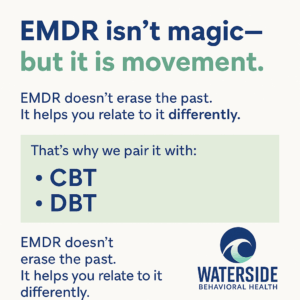When you’re deep in it—whether it’s depression, anxiety, trauma, or something more tangled—you stop looking for exits. Or maybe you stopped a long time ago.
You might have tried therapy before. Maybe you half-finished a program. Maybe nothing stuck. Now, the thought of trying again feels like a setup for more disappointment.
If that’s you, listen up: you’re not too far gone. You’re just not there yet.
And you’re not the only one who’s felt that way.
Disbelief Is Common—Especially If You’ve Been Hurt Before
Skepticism isn’t weakness. It’s protection.
If your past experiences with treatment felt rushed, irrelevant, or sugar-coated, it makes sense that you doubt anything else will work. Maybe a therapist talked over you. Maybe a program wasn’t built for people like you. Maybe you just weren’t ready yet—and nobody told you that was okay.
Here’s the truth: you’re allowed to be unsure. At Waterside, doubt isn’t something we try to “fix.” It’s something we make room for.
IOP Isn’t About Believing—It’s About Beginning
An Intensive Outpatient Program (IOP) in Plymouth County isn’t a lecture. It’s not rehab lite. And it’s not some bootcamp for people who need to be “snapped out of it.”
It’s structured, consistent care that meets you where you are. Even if where you are feels numb. Even if it feels pointless.
IOP typically includes:
- 3–5 sessions per week of group and individual therapy
- Access to psychiatric evaluation and medication support if needed
- Skills-based approaches like DBT and CBT to help with anxiety, regulation, and mood swings
- A chance to hear others who’ve also stopped believing—and are still here
This isn’t about being “ready.” It’s about being willing to let something different happen.
What Makes This Different From Everything Else You’ve Tried
For one, we’re not trying to sell you a happy ending. We’re offering you a middle space. A way to stay grounded without having to pause your life or pretend you’re okay.
We’ve worked with people who:
- Had already been to five therapists
- Said, “I’m not good at groups”
- Thought therapy was “just talking in circles”
- Were sure they’d feel like an outsider
And still, over time, they started showing up. Started telling the truth. Started hearing themselves in other people’s stories. And eventually, they stopped waiting to be “fixed” and started living again.

You Can Still Show Up Even If You’re Shut Down
We get it. Some days just making the call feels impossible.
But here’s what we’ve seen:
- People walk in blank-faced, sit in silence for two sessions… and then speak one line that changes everything.
- Clients say nothing for a week… and then scribble notes during every group.
- People come in guarded and leave with friends they never saw coming.
You don’t have to talk fast. You don’t have to trust everyone. You just have to walk through the door.
What If Your Story Isn’t Over?
It’s easy to believe this is just who you are now: someone who tried and failed. Someone who ruins good things. Someone who can’t connect, can’t change, can’t heal.
But that’s not the whole truth. That’s just the version you’ve been surviving with.
You’ve made it this far. Not because you didn’t struggle—but because part of you still hopes something could be different. That’s the part we work with.
And if you’re in Bristol County or Plymouth County, help is closer than you think.
You’re Not the Only One Who Showed Up Without Hope
“I hated the idea of group. I almost left on the first day. But something kept me there. Three months later, I’m still here—and I’m not ashamed of that.”
– Client, 33
“I thought I was too broken. Turns out, I was just too isolated.”
– IOP Participant, 29
“They didn’t try to fix me. They sat with me. That changed everything.”
– Client, 41
FAQs: Starting IOP When You Don’t Believe It Will Help
What if I don’t believe this will work?
You don’t have to. Doubt is expected—and allowed. Many people begin IOP uncertain or skeptical. The goal isn’t instant belief; it’s showing up long enough to see if something real starts to shift.
What if I’ve already tried therapy or rehab before?
That’s more common than you think. IOP is different because of its structure: multiple sessions a week, built-in accountability, and a mix of peer support and professional care. It’s not just “more therapy”—it’s a system that helps hold you when your belief falters.
Will I have to share in group right away?
No. You can go at your own pace. Some people talk on day one; others wait until they feel safer. Silence is okay. Showing up is enough.
Can I do IOP and still work or parent?
Yes. That’s one of the key benefits of IOP. It’s flexible enough to fit around jobs, school, and family responsibilities. We’ll work with your schedule to make it doable.
What if I start and want to stop?
That’s your choice. But we encourage clients to talk to their therapist before quitting. Sometimes what feels like a failure is actually the beginning of something breaking open.
Still Not Sure? You Don’t Have to Be.
Call 774-619-7750 or Contact Us to learn more about our Intensive Outpatient Program IOP services in Plymouth County, MA.




